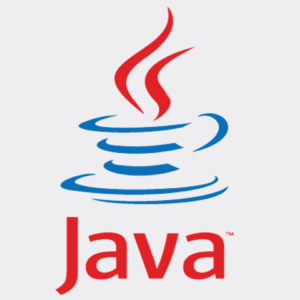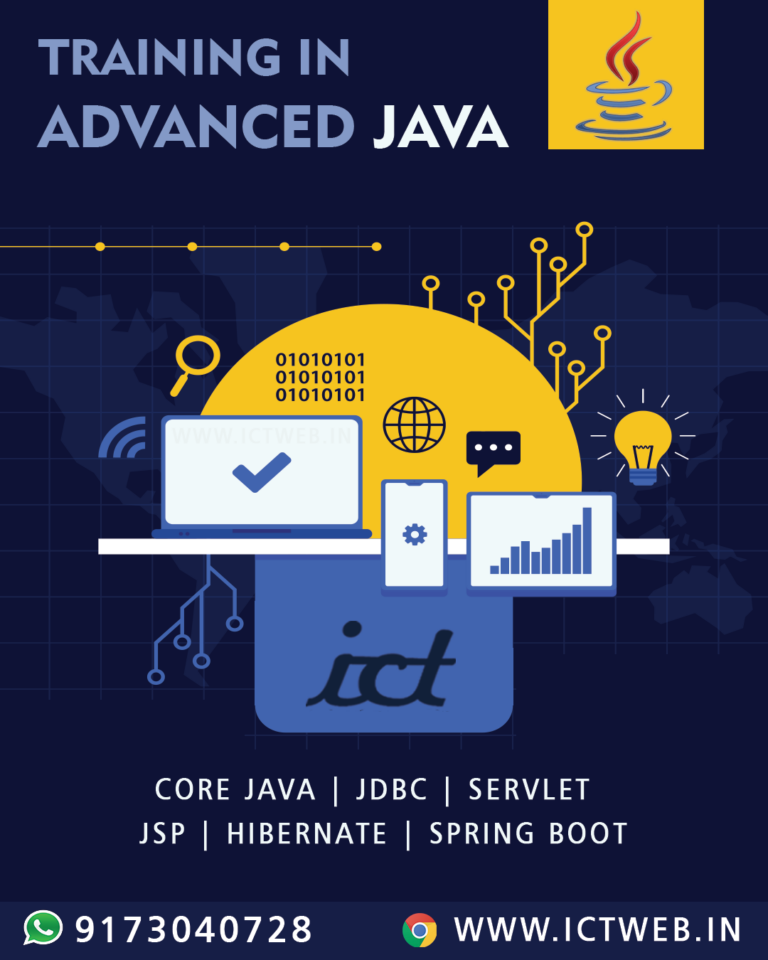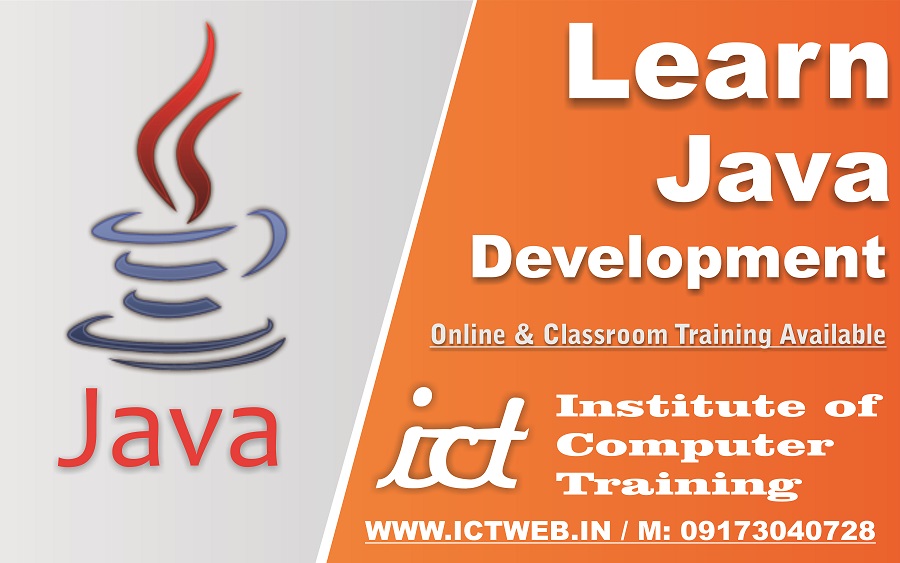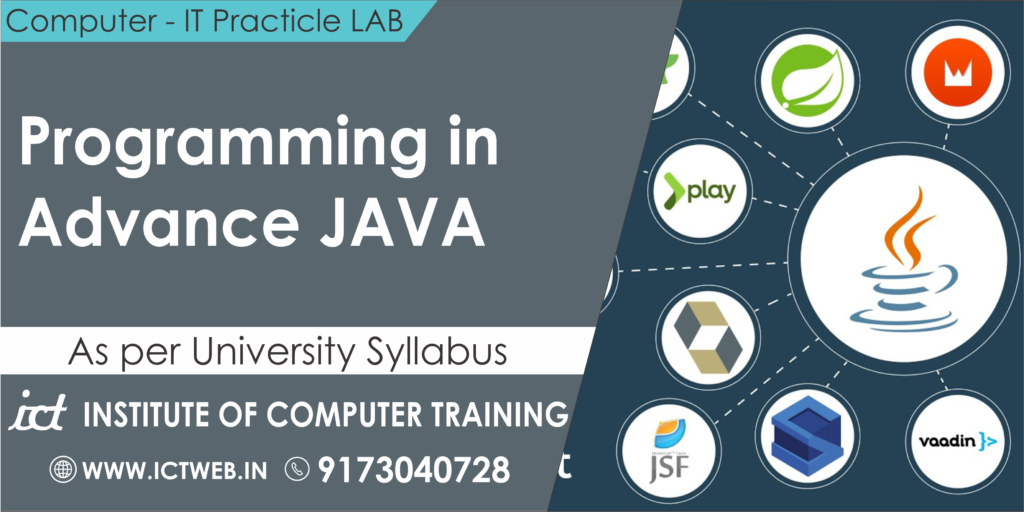ICT gives Java Project Training in Ahmedabad which Course Includes, Core Java, Advanced Java, Servlet, Hibernate, JSP, Spring Framework, Spring Boot or as per custom Java framework course syllabus. ICT Ahmedabad provide specialized in Java Project Training with techniques which necessary for a Web Development as well as Software Development career.
Looking to level up your Java programming skills? ICT Ahmedabad Advanced Java Course Training is designed for experienced developers who want to master complex Java concepts and enhance their ability to build robust, scalable applications. This comprehensive course covers advanced topics such as multithreading, collections framework, JDBC, design patterns, Java EE, Spring Framework, Hibernate, and much more. Whether you’re aiming to work with enterprise-level applications or improve your coding efficiency, this training will give you the expertise needed to tackle real-world development challenges. Our Advanced Java Training is ideal for professionals who already have a foundation in Java and want to deepen their knowledge in areas like networking, database integration, and server-side development. You’ll gain hands-on experience through practical assignments, coding exercises, and project work, ensuring you not only learn but also apply advanced Java techniques in various scenarios. Enroll today to become an expert Java developer with our Advanced Java Course. Whether you’re aiming for a senior software development role or want to work on high-end Java applications
Core Java
Advanced Java
Swing
GUI
JDBC
HTML
Servlet
Java Server Pages – JSP
JSTL
Frequently Asked Questions (FAQ) for “Advanced Java Course”
1. What topics are covered in the Advanced Java Course?
The course covers a wide range of topics designed to enhance your Java skills, including:
- Advanced OOP concepts (Inheritance, Polymorphism, Abstraction, and Encapsulation)
- Java Collections Framework (Lists, Sets, Maps, Queues)
- Multithreading and Concurrency
- Java I/O (Input/Output Streams, Serialization, File Handling)
- Exception Handling and Custom Exceptions
- Java Networking (Sockets, URL Handling)
- Java Database Connectivity (JDBC)
- Lambda Expressions and Functional Programming
- Java Reflection API
- Design Patterns in Java
- Java 8+ features (Streams API, Optional, etc.)
2. Who should take this course?
This course is designed for:
- Developers with a basic understanding of Java looking to deepen their knowledge.
- Professionals who want to enhance their skills in enterprise-level Java development.
- Anyone interested in mastering Java for application development, web development, and more.
3. What are the prerequisites for this course?
- Strong foundation in basic Java concepts (variables, loops, functions, arrays).
- Familiarity with object-oriented programming (OOP) principles.
- Basic understanding of Java IDEs (e.g., Eclipse, IntelliJ IDEA) and command-line usage.
4. Is prior knowledge of frameworks like Spring or Hibernate required?
No, prior knowledge of Java frameworks like Spring or Hibernate is not required for this course. However, knowledge of basic Java concepts and OOP will be helpful.
5. Will I learn Java Web Development in this course?
This course focuses on advanced Java programming concepts. While you will learn MySQL and JDBC (Java Database Connectivity), Java web development using frameworks like Spring or Java EE may be covered in separate specialized courses.
6. What are the learning outcomes of this course?
By the end of this course, you will:
- Have a solid understanding of advanced Java concepts and libraries.
- Be able to develop more complex, efficient, and robust Java applications.
- Understand multithreading and how to build concurrent programs.
- Be able to work with databases using JDBC.
- Write clean, maintainable, and scalable code.
7. How is the course delivered?
- Online Lectures: Live virtual classes by ICT Skills.
- Hands-on Labs: Practical coding exercises and real-world projects.
- Assignments: Quizzes and assignments to test understanding.
- Discussion Forums: Access to peer discussions and instructor support.
8. What are the course duration and schedule?
The course duration varies depending on the mode (Online or Offline Training):
9. Is there any certification provided after completing the course?
Yes, upon successful completion of the Advance course from ICT Ahmedabad, you will receive a certificate of completion that you can showcase on your resume or LinkedIn profile.
10. Can I get support if I have doubts during the course?
Yes, support is available through:
- Instructor Q&A Sessions: Live or scheduled for any course-related queries.
- Discussion Forums: Ask questions and get answers from peers and instructors.
- Email Support: Reach out to the course support team for assistance.
11. What tools or software do I need for this course?
You will need:
- Java Development Kit (JDK) (Java 8 or higher is recommended)
- Integrated Development Environment (IDE) like IntelliJ IDEA, Eclipse, or NetBeans
- Database (MySQL or PostgreSQL) for JDBC practice
- Maven/Gradle for dependency management (optional, based on course requirements)
12. Is there any project work or final exam in the course?
Yes, the course typically includes:
- Practical Project: A capstone project that demonstrates your understanding of advanced Java concepts.
- Final Exam: Some courses include a final exam that tests your overall knowledge of the course materials.
13. What happens if I miss a class or module?
- Recorded Classes: If you miss any class, you can usually access the recordings.
- Makeup Assignments: Some courses allow you to make up missed work by completing additional assignments.
14. How can I register for the course?
- Visit the course website and select the course you wish to enroll in.
- Complete the registration form and payment process.
- Once registered, you’ll receive access to course materials and the learning platform.
15. Can I access the course after completion?
Yes, many platforms allow lifetime access to course materials, including updates to content and access to the community or forum.
If you have any other questions or need more information, feel free to reach out to our Institute!
Java is a general-purpose computer-programming language that is concurrent, class-based, object-oriented, and specifically designed to have as few implementation dependencies as possible. It is intended to let application developers “write once, run anywhere” (WORA), meaning that compiled Java code can run on all platforms that support Java without the need for recompilation.
Java applications are typically compiled to “bytecode” that can run on any Java virtual machine (JVM) regardless of the underlying computer architecture. The language derives much of its original features from SmallTalk, with a syntax similar to C and C++, but it has fewer low-level facilities than either of them.
As of 2016, Java was one of the most popular programming languages in use, particularly for client-server web applications, with a reported 9 million developers.
Java is still a relevant programming language that shows no sign of declining in popularity and, for that reason, is worth learning. Most developers pick it up as their first programming language because it’s reasonably easy to learn.
- Building Android apps
Although there are other ways to make Android apps, most of the applications are written in Java using Google’s Android API. Although Android uses difference JVM and packaging methods, the code is still predominantly Java.
- Java web applications
Many government, healthcare, insurance, education, and defence departments have their web applications built in Java. A significant example of this is Google’s Gmail.
- Software tools
Many useful software and development tools are written and developed in Java, e.g. Eclipse, IntelliJ IDEA and NetBeans IDE.
- Scientific applications
Nowadays, Java is often the default choice for scientific applications, including natural language processing. The main reason for this is because it is safe, portable, maintainable and comes with better high-level concurrency tools than C++ or any other language.
Depending on your career prospects, Java can take you on different career paths. Whether you’re interested in building games, mobile applications, desktop applications, or web applications, Java is capable of working in these environments.
Regardless of whether or not you use Java in your career or job role, you’ll learn syntax, ideas, patterns, tools, styles, and idiosyncrasies that are readily transferable to other programming languages as well.
Learning Java will give you the opportunity to see how one language does something in comparison to another. Additionally, knowing what works for Java and other languages will make you an even better well-rounded developer.
Now, there are lots of programming languages out there to choose from, and I don’t believe in competition between them. All languages were created for a specific reason, and have evolved and contributed in some way to the technological advances of our times. Pitting them against each other usually ends up watering down the main reason the language was conceived.
That said, each language has its strong and weak points. In my opinion, a great language to have an understanding of is Java.
It can be summed up into one, simple sentence: Java is a mature language. This leads to:
1. Lots of information
2. An incredible tool-set
3. Software that leads by example
4. Killer editors
5. Omnipresence
6. Lots of available jobs
7. Android adoption
8. Ease of learning
More information about java Visit ICT.





